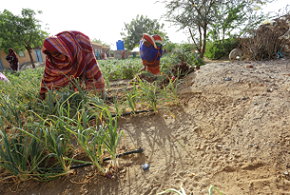Introduction
Agriculture is the practice of raising animals and cultivating crops. To meet the growing need of the population, the seed is crucial in the development of palatable foods. It is a fertilized ovule that germinates to give rise to new plants. The crucial phase in agriculture is choosing good quality seeds because they can reduce replanting, improve uniformity, and encourage the early growth of crops. Proper agricultural practices increase the yield and quality of crops produced.
Selection of Seeds
In general, seed quality affects plant development. Selecting effective seeds, and seed selection can boost agricultural yield. Getting seeds from healthy plants is crucial for agriculture since many different plant diseases can be spread through them. Spreading out chosen seeds over the initially prepared soil is the act of sowing. When choosing seeds for sowing, the following characteristics of the seeds are essential:
- Infections shouldn’t be present in the seeds.
- They ought to have a strong ability to germinate.
- A specific seed shouldn’t be combined with weeds or other seeds.
- They ought to produce the desired amount of crops.
- Avoid using seeds that have been damaged or crushed.
- They ought to be immune to illness.
- They ought to be able to endure challenging circumstances.
Steps to Ensure Proper Growth of Seeds
Agricultural practices are a set of rules used in the agricultural sector to make farming easier and produce better agricultural goods.

Preparation of Proper Soil
The agricultural area must be prepared for crop production through soil preparation. For seeds to germinate and help with efficient agricultural cultivation, it is necessary. The process of preparing soil involves these three steps:
- Tilling/Ploughing: ploughing is the process of liquifying and moving the soil to improve adequate aeration and bring the nutrient-rich soil to the surface of the land. It is done with a cultivator, hoe, or plough.
- Levelling: Because the earth is lumpy and irregularly dispersed, the levelling procedure distributes the soil evenly and levels it out. Additionally, it guards against soil erosion.
- Manuring: To grow and produce fruits and seeds, plants need the right nutrition. Applying manure to agricultural land is known as manuring. Manure is an organic material that has decomposed and is used to enrich the soil by delivering nutrients for crop growth.
Sowing of Seeds or Planting
Sowing refers to the act of distributing or planting seeds. The right depth and quantity of water must be used while planting seeds. To achieve a desirable culture, the right seeding distance and interval are crucial. The following are some seeding techniques:
- Traditional method: For sowing, a funnel is employed that is filled with seeds that are travelling via pipes with sharp edges. The seeds are dispersed as the pipe’s edge penetrates the ground.
- Broadcasting: By distributing seeds throughout the ground, seeds are sown by the manual or mechanical method called broadcasting. However, owing to the uneven seed dissemination, this strategy is not advised for the growth of high-yielding crops.
- Dibbling: The act of “dibbling” involves evenly spacing the seeds in the seedbed before covering them with dirt. A long, pointed tool called a “dibbler” is used to make holes in the earth before sowing.
- Seed drill: Typically, tractors are utilized to assist in the sowing of seeds using a seed drill. The seeds can be sown at the proper depth and distance, and it is crucial to make sure the soil is covered after sowing.
- Transplantation: The seedlings are moved to the cultivable land after the seeds have initially been sown in a small garden. As a result, this procedure takes a long time.
Proper and Timely Irrigation
Agriculture requires proper irrigation since excessive watering can harm the soil by causing water logging, which hinders the soil’s ability to absorb nutrients and minerals. Because the farmer needs to supply enough water, successive irrigation necessitates breaks.
Supply of Proper Manure and Fertilizers
To provide the nutrients needed for plant growth, manure and fertilizers are added. Manure is made from decomposed animal and plant wastes, making it an environmentally benign substance that also improves soil fertility. Inorganic fertilizers like ammonium sulfate, ammonium phosphate, and NPK are produced commercially, and too much fertilizer can impair the soil’s ability to support plant growth.
Protection of Crops/Plants From Weeds
Unwanted plants, known as weeds, can harm farmed plants by growing near desirable ones. Crop yields are reduced, and pests and diseases use it as a host plant. These are eliminated by hand or using weed killers like naphthalene, acetic acid, etc.
Summary
The crucial phase in agriculture is choosing good quality seeds because they can reduce replanting, improve uniformity, and encourage the early growth of crops. Selecting effective seeds, and seed selection can boost agricultural yield. Agricultural practices are a set of rules used in the agricultural sector to make farming easier and produce better agricultural goods. The right depth and quantity of water must be used while planting seeds.
Frequently Asked Questions
1. What makes Manure and Fertilizer different from one Another?
Ans. Fertilizers like ammonium sulfate are inorganic, whereas manure is an organic chemical made from the breakdown of plant and animal waste.
2. Write a note on Agricultural Practices.
Ans. Agriculture practices are a collection of rules that make farming easier. It entails the following: preparing the soil, choosing the right seeds, sowing, applying manure, fertilizers, and weedicides, as well as ensuring correct watering, harvesting, and storing.
3. Define Winnowing and Threshing.
Ans. Winnowing is the technique of separating grains utilizing the wind, whereas threshing is the act of freeing harvested grains by hand-battering or mechanical means.
4. What role does Seed Selection Play in Agriculture?
Ans. For the development of new individual plants, seeds are necessary. The development of desirable crops that decrease replanting and increase crop production can be achieved by choosing high-quality seeds.
 Mission Statement
Mission Statement
“Empower every student to achieve full potential”
88Guru has been established with the social objective of making quality video-based learning material available to all Indian students. Technology, Connectivity and Social Media are rapidly changing the world of Education and we wish to lead the transformation of the tuition industry in India.
88Guru is the perfect complement to the current tuition model. 88Guru creates a wonderful opportunity for children and parents to bond while engaging in a valuable learning activity. It also provides the complete curriculum at your fingertips for those moments when you need some help at short notice. We believe that this mode of tuition could be transformational, adding hours to a child's day while providing complete control over the learning process.
Every course is taught by the best teachers from India's top schools and conducted in an engaging manner to keep students involved. The e-learning process consists of video-based instructions, computer-graded assignments, and a dashboard which allows the student and parent to track progress.


